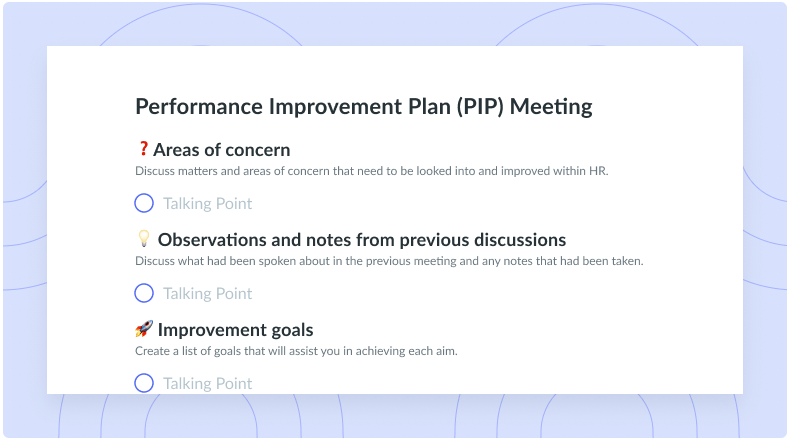Happy Monday fellow managers and leaders!
Welcome to issue 60 of the Manager TLDR 🎉
In today’s newsletter, we’re covering:
- The 1-on-1 meeting template every manager needs
- How to tell an employee they’re not meeting expectations
- Best practices to run an organized townhall meeting
- and more…
Let’s get into it ⬇
🎙New on the Supermanagers podcast
- Does your team bring you bad news? How to know if you have a reward or fear-based culture with Anna Curzon (Chief Product Officer at Xero).
- The best managers don’t rescue, they coach: Why your goals should be thrilling, important, and daunting with Michael Bungay Stanier (author of The Coaching Habit).
- If it’s perfect, it’s too late: Why you should give up tasks and delegate projects with Lloyed Lobo (co-founder of Boast.AI).
- Hiring, training, learning: The 3 elements of building high-performing teams with Dan Greene (Sr. VP of North American Sales and Growth at Impossible Foods).
🌟Highlights from the Fellow blog
📅 One-on-One Meeting Template: Top 10 Questions and Examples (16 min read)
One of the most-read resources in the Fellow blog, this post outlines 10 questions every manager should ask their direct reports during 1-on-1 meetings and sample templates to get your team inspired for these conversations!
TLDR: Having a one-on-one meeting template in place is a great way to make sure you’re talking about the important things during these meetings. Your template can include sections such as wins, challenges, and learnings every week. Other topics, such as professional development and goals can be discussed on a quarterly basis.
As Julie Zhuo, former VP of Product Design at Facebook argues in The Making of a Manager, one-on-one meetings let you discuss important topics that would never come up otherwise:
“The most precious resource you have is your own time and energy, and when you spend it on your team, it goes a long way toward building healthy relationships. This is why one-on-one meetings are such an important part of management!”
🤔 How to Tell an Employee They’re Not Meeting Expectations (7 min read)
TLDR: One uncomfortable conversation that is impossible to avoid is meeting with an employee to let them know their performance isn’t meeting expectations. No matter how awkward, this conversation should be had as soon as possible, not only to get it off your to-do list, but also to get the employee on the right track quickly.
If you’re currently in a situation where an employee isn’t meeting expectations and are unsure how to go about the conversation, these tips are here to help:
- Ask how they think they are performing first: In addition to having them do a brief self-evaluation, ask the employee to list some key metrics and examples for how they measure their own levels of performance. Hopefully, the employee will be on the same page as you and know they’ve missed the mark on more than one occasion.
- Find where expectations don’t align: Priorities between a manager and their direct report must always be aligned so no one is wasting their time or energy on work that isn’t as important as other tasks. Agreeing on priorities, due dates, and goals ahead of time can create this alignment before important task deadlines are missed.
- Make a plan together: Next, you’ll want to create a plan of action and find ways to coach them along their path of improvement. Whether it’s creating a performance improvement plan, requesting daily updates on specific tasks, or giving them a specific deadline, you’ll want to find what motivates them best. Ask this individual how you can best support them on their path forward, and find out how they’d like to proceed.

📢 How to Run an Organized Town Hall Meeting (7 min read)
TLDR: Town hall meetings (also called town hall forums or all hands) bring everyone in an organization together to discuss important topics. They are an opportunity for team leads to present new information and for employees of all levels to contribute to the conversation. Town halls are the best way for upper management to connect with employees on other levels, creating more transparency in organizational decisions. Here are our 3 (out of 11) favourite tips to run effective town hall meetings:
- Encourage shoutouts: Employees value public recognition in the workplace. What’s a better way to openly recognize great work than by shouting out these successes during the town hall? These shoutouts can go a long way to making an employee feel appreciated and showing other teams that you’re seeing the value that individual employees bring to the company.
- Create a collaborative agenda: In order to have a dynamic and inclusive conversation, ask managers and leaders from different departments to add talking points to the meeting agenda in advance of the town hall.
- Gather feedback regularly: Asking for feedback after the meeting, or checking in with a diverse selection of employees, can help you get constructive feedback for future town halls.
… and that’s a wrap! We hope that the content we curated inspires you to continue growing as a leader! 🌱
If you enjoyed this issue, please share the newsletter with a colleague or friend – they can subscribe here.
Thanks for being part of our community,
Manuela & the Fellow.app team








